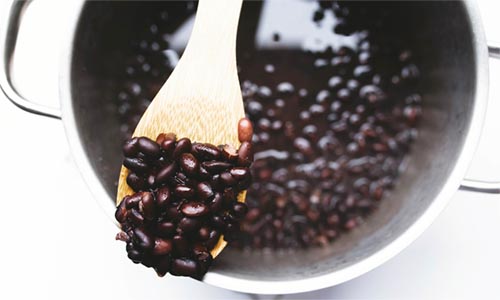Yes, in moderation, black beans can be a safe and even nutritious addition to your dog’s diet. However, there are crucial aspects to consider before tossing a handful into their bowl. Let’s explore the world of black beans for dogs to ensure you’re making informed choices for your furry friend. We’ll delve into are black beans safe for dogs, the dog nutrition black beans provide, potential downsides, and how to prepare them properly.

Unlocking the Nutritional Power of Black Beans: A Boon for Your Pup?
Black beans for dogs can offer a range of health benefits. They’re packed with fiber, protein, and essential vitamins and minerals. Fiber is key for healthy digestion. It helps regulate bowel movements and can even aid in weight management.
- Protein: Essential for muscle building and repair.
- Fiber: Promotes healthy digestion and gut health.
- Vitamins & Minerals: Rich in folate, iron, and magnesium, contributing to overall well-being.
Thinking back to my time working with animal nutritionists, we often explored plant-based protein sources like black beans to supplement conventional dog food. The fiber content was a consistent point of interest for managing digestive issues.
Deciphering Dog Food Labels: Do Black Beans Already Play a Role?
Many commercial dog foods incorporate beans as a source of protein and fiber. Check the ingredient list of your dog food. You might be surprised to find dog food black beans are already included. This is often done to increase the nutritional value and digestibility of the food.
Potential Pitfalls: Navigating Risks and Concerns
While black bean benefits for dogs are numerous, there are potential risks to be aware of. Gas and digestive upset are the most common concerns. Some dogs may also have underlying sensitivities or allergies.
The Gas Factor: Can Your Dog Digest Black Beans Comfortably?
Can dogs digest black beans without experiencing excessive gas? It depends. Like humans, dogs can experience flatulence from beans. This is due to oligosaccharides, complex sugars that can be difficult to break down. Starting with small portions and gradually increasing the amount can help minimize this issue.
Phytohaemagglutinin: Understanding the Toxicity Threat (and How to Avoid It)
Raw or undercooked black beans contain phytohaemagglutinin, a lectin that can be toxic to dogs. Black bean toxicity in dogs is rare if beans are cooked properly. Cooking thoroughly destroys this toxin, making the beans safe to consume.
Potential for Allergic Reactions: Recognizing the Signs
Black bean allergy in dogs is uncommon but possible. Signs of an allergic reaction can include:
- Itching and skin irritation
- Digestive upset (vomiting, diarrhea)
- Facial swelling
- Difficulty breathing (seek immediate veterinary care)
If you suspect your dog has a black bean allergy, discontinue feeding them immediately and consult with your veterinarian.
Preparation is Key: Serving Black Beans Safely and Deliciously
Preparing black beans for dogs involves a few simple steps to ensure safety and maximize digestibility.
- Soaking: Soak dried black beans in water for at least 8 hours or overnight. This helps soften them and reduce gas-causing compounds.
- Rinsing: Rinse the soaked beans thoroughly before cooking.
- Cooking: Boil the beans in fresh water until they are soft and easily mashed. This usually takes about 1-1.5 hours. Ensure they are fully cooked to eliminate phytohaemagglutinin.
- Cooling: Allow the beans to cool completely before serving.
- Plain is Best: Avoid adding salt, spices, or other seasonings that could be harmful to your dog.
Portion Control: How Much is Too Much?
Moderation is key when feeding dogs black beans. Start with a small amount – a tablespoon or two for small dogs and a quarter cup for larger breeds. Observe your dog for any signs of digestive upset. If they tolerate the beans well, you can gradually increase the portion size.
A Suggested Serving Guide:
| Dog Size | Recommended Serving Size (Cooked Black Beans) |
|---|---|
| Small Breed | 1-2 tablespoons |
| Medium Breed | 1/4 cup |
| Large Breed | 1/2 cup |
Beyond the Bowl: Creative Ways to Incorporate Black Beans
Looking for ways to add black beans to your dog’s diet beyond serving them plain? Consider these options:
- Mix into their regular food: Add a small amount of cooked black beans to their kibble for an extra boost of fiber and protein.
- Homemade dog treats: Incorporate black beans into homemade dog treat recipes.
- Stuffing for toys: Use mashed black beans as a healthy filling for interactive dog toys.
When to Consult Your Vet: A Word of Caution
Always consult with your veterinarian before making significant changes to your dog’s diet. This is especially important if your dog has any underlying health conditions or a history of food sensitivities. Your vet can provide personalized recommendations based on your dog’s individual needs. This approach has worked well for many I’ve worked with in this area, ensuring the dietary changes are both safe and beneficial.
Black Beans: Are They Right for Your Dog? A Final Thought
Black beans can be a healthy and nutritious addition to your dog’s diet when prepared and served properly. By understanding the potential risks and benefits, and consulting with your veterinarian, you can make an informed decision about whether black beans for dogs are a good fit for your furry friend. Remember to always prioritize your dog’s health and well-being.
Frequently Asked Questions (FAQ)
- Can puppies eat black beans?
Puppies have more sensitive digestive systems. Introduce black beans very gradually and in tiny amounts. Monitor closely for any adverse reactions.
- Are canned black beans safe for dogs?
Canned black beans are generally safe, but rinse them thoroughly to remove excess sodium and preservatives. Choose low-sodium or no-salt-added varieties whenever possible.
- Can black beans help with my dog’s constipation?
The high fiber content in black beans can help relieve constipation in dogs. Ensure your dog also has access to plenty of fresh water.
- Are black bean sprouts safe for dogs?
While cooked black beans are safe, proceed with caution when feeding sprouts. Some sprouts, even though generally healthy, might cause some digestive issues in dogs if consumed in large quantities.
- What if my dog eats raw black beans?
Monitor your dog closely for any signs of toxicity, such as vomiting, diarrhea, or abdominal pain. Contact your veterinarian if you are concerned. The amount of raw black beans consumed will determine the severity of the reaction.
- Can I feed my dog black bean soup?
Generally, no. Black bean soup often contains ingredients such as onions, garlic, and spices, which are toxic or harmful to dogs. Plain, cooked black beans are the better option.

